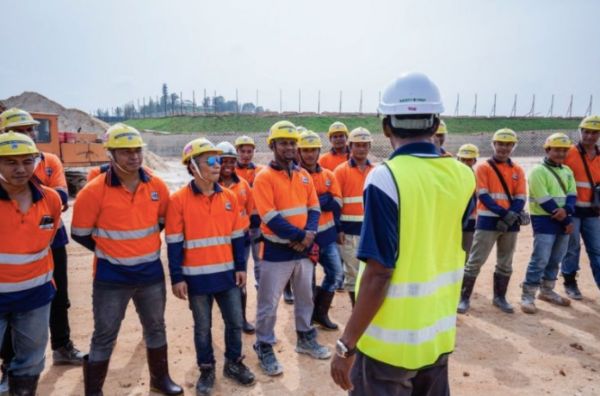What Are ‘Toolbox Talks’ And Why Are They Important?

Unlike an official safety meeting or training session, a toolbox talk is a shorter, more informal discussion, with a goal to support and reinforce your overall safety program by focusing on a specific safety issue with each talk.
By offering a more informal space for discussion and drilling down into very specific areas of safety, they are an effective way to refresh your employees knowledge, keep them up-to-date with regulation, equipment and safety-procedure changes, and allow for more experienced workers to share their experience with the group.
Some of the benefits to your business include:
- Actively involving your workers in safety matters
- Reducing risks by increasing safety awareness
- Motivating workers to follow your SOP and demonstrates its importance
- Promoting discussion of employees experiences for future improvement
Most importantly – effective toolbox talks can save lives.
What topics should you cover?
A good tip for finding topics is to conduct an inspection of the work area to identify existing problems and potential risks. You can also ask your employees directly to uncover queries or any confusion they may have around certain safety areas.
Other topical areas include:
- Regulation changes
- Equipment updates
- PPE changes
- Role responsibilities
- Emergency procedures
- Preventative practices; such as the proper use of safety knives to prevent injury and accident
When, where and how long?
Toolbox talks should be scheduled for the beginning of a work shift and take place onsite for demonstration purposes and minimal work disruption.
These talks should be clear, concise and no longer than 10-15 minutes. Have a clear agenda and stay on track to cover all the important points and retain employee engagement.
How to prepare?
Create an agenda to be used as a template for all meetings to make preparation easier and for consistency.
Here is an example toolbox talk agenda:
- Begin with a positive. Express gratitude for a specific employee or the performance of the team.
- Quick review of the last meeting and outcomes.
- Choose your topic and keep your talk to 3-4 points to explain the topic and its importance to the safety of the entire group and company.
- Allow time for questions and discussion
- Finish with a quick review and mini ‘test’ to check the topic was understood.
How do you engage employees during a talk?
You want your workers to be engaged so that they, and the company, gets the most benefit from the talk. Try using stories, props and visual aids to explain the correct safety behaviour, keep your talk positive, encourage discussion and create safety ‘rewards’ for employees who demonstrate the correct safety behaviour that week.
Toolbox talks are a simple and effective way to improve the safety of your organisation, engage your employees and keep an open line of communication and information.
By keeping them short, sharp and topical, you minimise work disruption for minimal additional costs to your business while creating greater safety awareness, and helping to reduce injury, equipment damage and their related downtime costs.


 MBIE: Gas Supply Reducing Faster And Sooner Than Previously Forecast
MBIE: Gas Supply Reducing Faster And Sooner Than Previously Forecast Natural Hazards Commission: International Markets Show Unprecedented Confidence In NZ’s Natural Hazards Insurance Scheme
Natural Hazards Commission: International Markets Show Unprecedented Confidence In NZ’s Natural Hazards Insurance Scheme  ASB Bank: ASB Business Survey - The Impact Of Trump's Tariffs, According To Kiwi Businesses
ASB Bank: ASB Business Survey - The Impact Of Trump's Tariffs, According To Kiwi Businesses University of Auckland: Will Robots Help Older People Stay Sharp?
University of Auckland: Will Robots Help Older People Stay Sharp? Electricity Authority: Authority Confirms New Next-Gen Switching Service; Proposes Multiple Trading Relationships For Consumers
Electricity Authority: Authority Confirms New Next-Gen Switching Service; Proposes Multiple Trading Relationships For Consumers Mānuka Charitable Trust: Mānuka Charitable Trust Warns Global Buyers Of Misleading Australian Honey Claims
Mānuka Charitable Trust: Mānuka Charitable Trust Warns Global Buyers Of Misleading Australian Honey Claims 


